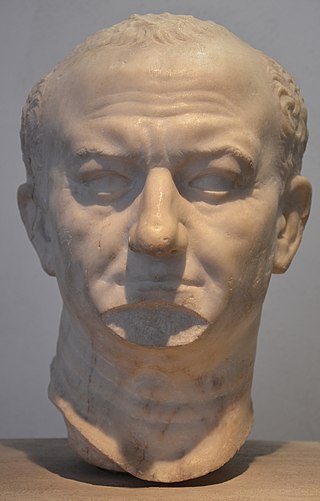See also
- Constantine Constantius, a pseudonym of Søren Kierkegaard
- Constantine
Constantius may refer to:

Constantius II was Roman emperor from 337 to 361. His reign saw constant warfare on the borders against the Sasanian Empire and Germanic peoples, while internally the Roman Empire went through repeated civil wars, court intrigues, and usurpations. His religious policies inflamed domestic conflicts that would continue after his death.
The 330s decade ran from January 1, 330, to December 31, 339.
The 340s decade ran from January 1, 340, to December 31, 349.
The 280's decade ran from January 1, 280, to December 31, 289.

Year 337 (CCCXXXVII) was a common year starting on Saturday of the Julian calendar. At the time, it was known as the Year of the Consulship of Felicianus and Titianus. The denomination 337 for this year has been used since the early medieval period, when the Anno Domini calendar era became the prevalent method in Europe for naming years.

Flavius Valerius Constantius, also called Constantius I, was a Roman emperor from 305 to 306. He was one of the four original members of the Tetrarchy established by Diocletian, first serving as caesar from 293 to 305 and then ruling as augustus until his death. Constantius was also father of Constantine the Great, the first Christian emperor of Rome. The nickname "Chlorus" was first popularized by Byzantine-era historians and not used during the emperor's lifetime.

The term Western Roman Empire is used in modern historiography to refer to the western provinces of the Roman Empire, collectively, during any period in which they were administered separately from the eastern provinces by a separate, independent imperial court. Particularly during the period from AD 395 to 476, there were separate, coequal courts dividing the governance of the empire into the Western provinces and the Eastern provinces with a distinct imperial succession in the separate courts. The terms Western Roman Empire and Eastern Roman Empire were coined in modern times to describe political entities that were de facto independent; contemporary Romans did not consider the Empire to have been split into two empires but viewed it as a single polity governed by two imperial courts for administrative expediency. The Western Empire collapsed in 476, and the Western imperial court in Ravenna disappeared by AD 554, at the end of Justinian's Gothic War.

Flavius Claudius Constantius Gallus was a statesman and ruler in the eastern provinces of the Roman Empire from 351 to 354, as Caesar under emperor Constantius II, his cousin. A grandson of emperor Constantius Chlorus and empress Flavia Maximiana Theodora, and a son of Julius Constantius and Galla, he belonged to the Constantinian dynasty. Born during the reign of his uncle Constantine the Great, he was among the few male members of the imperial family to survive the purge that followed Constantine's death. Under Constantius II, Gallus served as deputy emperor, based in Antioch and married to Constantius' sister Constantina. He dealt with a Jewish revolt in the years 351-352. Gallus ultimately fell out of favor with Constantius and was executed, being replaced as Caesar by his younger half-brother Julian.

The gens Flavia was a plebeian family at ancient Rome. Its members are first mentioned during the last three centuries of the Republic. The first of the Flavii to achieve prominence was Marcus Flavius, tribune of the plebs in 327 and 323 BC; however, no Flavius attained the consulship until Gaius Flavius Fimbria in 104 BC. The gens became illustrious during the first century AD, when the family of the Flavii Sabini claimed the imperial dignity.
(Flavius) Julius Constantius was a member of the Constantinian dynasty, being a son of Emperor Constantius Chlorus and his wife Flavia Maximiana Theodora, a younger half-brother of Emperor Constantine the Great and the father of Emperor Julian.

The Illyriciani or Illyrian emperors were a group of Roman emperors during the Crisis of the Third Century who were of Illyrian origins and hailed from the region of Illyricum, and were raised chiefly from the ranks of the Roman army.

The Constantinian dynasty is an informal name for the ruling family of the Roman Empire from Constantius Chlorus to the death of Julian in 363. It is named after its most famous member, Constantine the Great, who became the sole ruler of the empire in 324. The dynasty is also called Neo-Flavian because every Constantinian emperor bore the name Flavius, similarly to the rulers of the first Flavian dynasty in the 1st century.
An unnamed daughter of Julius Constantius was the first wife of Constantius II.
Galla was the first known wife of Julius Constantius, a member of the Constantinian dynasty.
Basilina was the wife of Julius Constantius and the mother of the Roman emperor Julian who in her honour gave the name Basilinopolis to a city in Bithynia.

Constantine the Great's (272–337) relationship with the four Bishops of Rome during his reign is an important component of the history of the Papacy, and more generally the history of the Catholic Church.
Flavius Ablabius or Ablavius was a high official of the Roman Empire and contemporary of Emperor Constantine I. and tutor to his son, Constantius II.
Flavius Arintheus was a Roman army officer who started his career in the middle ranks and rose to senior political and military positions. He served the emperors Constantius II, Julian, Jovian and Valens. In 372 he was appointed consul, alongside Domitius Modestus.
Seleucus also known as Flavius Seleucus and Count Seleucus was a wealthy Greek rhetor who was a close friend of Libanius and the Roman emperor Julian.